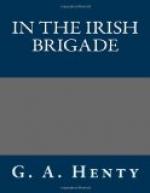The marshal had gone on with the greater portion of his staff, Desmond having been detailed to accompany the division from Toledo. When within two days’ march of Badajos, an orderly brought a note from the marshal, requesting him to ride forward at once. This he did without loss of time.
Marshal de Bay had taken up his quarters at Badajos, and on arriving in the town, Desmond alighted at the governor’s house.
“It was a stupid mistake of mine,” the head of the staff said, “in sending you on detached duty. I forgot at the moment, when I nominated you, that your knowledge of the locality would be invaluable to us. I only thought of it yesterday when, on the marshal asking for some information on this matter, I pulled out your report. He examined it and said, ’This is very complete and valuable, Colonel. Whom is it made by?’
“‘By an officer of your staff, sir, Captain Kennedy.’
“‘Where is he?’
“‘He is coming down with the Toledo column, sir.’
“‘Please send for him at once,’ he said. ’One of the others should have been detached for that service. He is just the man we want here.’
“Accordingly we sent for you, and here you are.”
“This is an excellent report of yours, sir,” the duke said, when the colonel introduced Desmond to him. “As we came down, I noticed that the roads had, in many cases, been thoroughly repaired at the points mentioned in your report as being particularly bad, and the bridges in many places greatly strengthened. Had it not been for that, I do not know how I should have got my guns along.
“And now, sir, I want to ask you a few questions as to the road on the other side. By your report, I see that you consider the road through Campo Mayor to be the only one by which an army could move, and that a large body of workmen must be employed to make the other road fit for the passage of cannon.”
He then asked a number of questions concerning this road.
“I see,” he said, “you have marked several places, in your report, where an enemy coming down that road could post themselves strongly, and others which might be defended to advantage by us.”
“Yes, sir; but of course, the suitability of those places would depend largely upon the respective strength of the armies.”
The marshal nodded approvingly.
“From all I hear from our agents in Lisbon,” he said, “the enemy’s forces will be superior to our own in numbers, but the main portion are Portuguese, who have shown very little fight, hitherto. Their cavalry are almost entirely Portuguese. The only really fighting portion of their forces are the English and Dutch, who are most formidable foes; but against these we have our French regiments, on whose bravery we can rely. Were it not that I think the Portuguese will probably, as at the battle of Almanza, fly as soon as the engagement begins, I should fall back and take up a strongly defensive position. As it is, in spite of their superior numbers, I think we can meet them on an equal field.”




